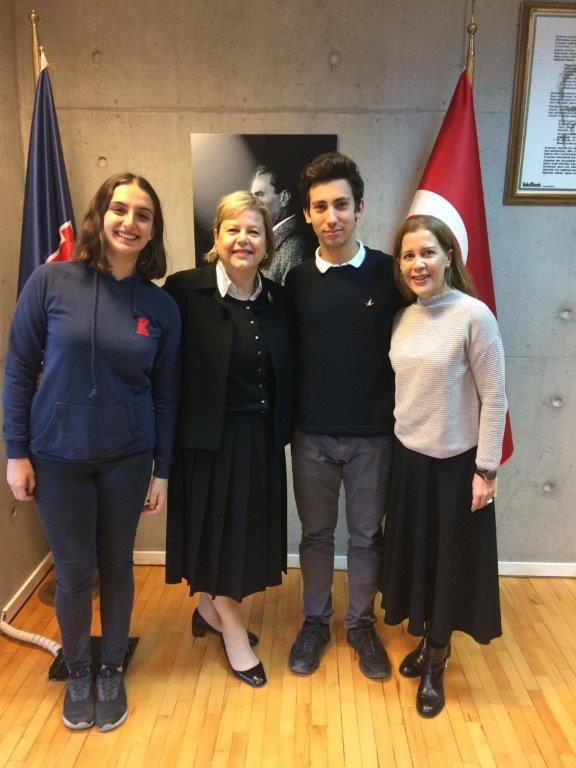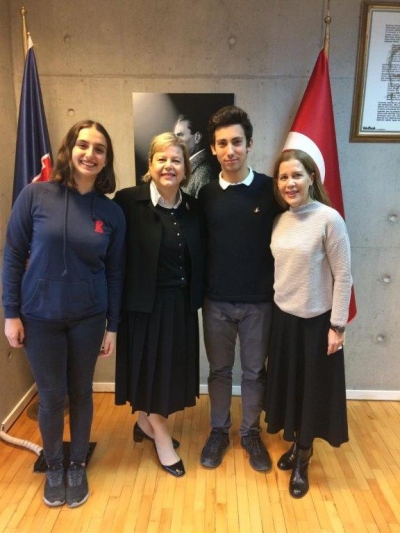Baltık Denizi Ülkeleri Felsefi Deneme Yazma Yarışmasında Bronz Madalya Kazandık

22 Ekim 2018 tarihinde katıldığımız, dünya çapından öğrencilerin internet üzerinden the Finnish Association of Philosophy and Ethics Teachers (Finlandiya Felsefe ve Etik Öğretmenleri) aracılığıyla katıldığı, Baltic Sea Philosophy Essay Event 2018 / Baltık Denizi Ülkeleri Felsefi Deneme Yazma Yarışmasında, 12B sınıfı öğrencimiz Mert CEMRİ ve 12A sınıfı öğrencimiz Didem ÖZÇAKIR İngilizce olarak yazdıkları deneme yazıları ile okulumuzu başarı ile temsil ettiler. Öğrencilerimizden Mert CEMRİ, Baltic Sea Philosophy Essay komisyonu tarafından bronz madalya ile ödüllendirildi.


Felsefe bilgisinin yaşamımız için ne denli önemli olduğunu yazdıkları denemelerle anlatan, Okulumuzun adını Türkiye sınırlarının dışında duyuran öğrencilerimizi kutluyor, başarılarının devamını diliyoruz.
https://bspee.wordpress.com/2018/11/15/winning-essays-bronze/
Bronz Madalya Kazanan Mert CEMRİ’nin Yazısı
“Perhaps you have had the thought that nothing really matters, because in two hundred years we’ll all be dead.”
Thomas Nagel: What does it all mean? (1987)
Oxford University Press, p.95
In this citation, Thomas Nagel suggests that the reason and purpose of a man’s life only concerns himself. Some may suggest that, in an Epicurean way, people should live to get the most of it from their lives, as we live only once and the true meaning of life is to make ourselves happy while living. However, how a profound and justifiable idea is that? Are we responsible for leaving a legacy to next generations or should we concern ourselves with the effects of our actions? What is the real meaning of life if we are not going to think about the consequences of our actions and do we live a meaningless life? In this essay I will try to portray answers to these questions and finally express my view on the matter.
The question of the meaning of life is as old as the human history. Since the first Homo Sapiens evolved from its closest ancestor in the evolutionary journey, it began to do what differentiates itself from its animal relatives: to investigate its environment and ask questions. It was not late when the questions themselves had evolved and primitive questions like “How do I get more food and hunt easily?” and “How can I find a safe shelter?” turned into questions like “Why am I here”, “How am I here” and “What is the purpose of life?”. There were various opinions about the meaning of life as time progressed.
If we were to be guided by A. Comte’s law of three stages, there were exactly three stages of human thinking. The most primitive of these stages was the theological state, where people related their lives’ meaning to God. As mentioned above, people began to ask philosophical questions that are still debated in the modern world the moment they began thinking. And in their ignorance, those primitive humans found the answer of their question with God. God was the ultimate creator- he knew everything and created everything and the purpose of humans back then was to be loyal servants of their deity. As the humanity advanced and the concept of God was not providing enough answers for their questions, the second stage-the metaphysical stage - was adopted, where the organized religions were established and the humanity had more complex answers they could use to answer their quests for the true meaning of life. It was unthinkable that the human life was for no purpose, and we must have had a purpose because the God created us all and God would not create anything meaningless. However, as the humanity progressed further, science advanced as well and the new scientific theories and laws we had were not supporting the metaphysical stories we had. It was understood that the metaphysical stories were made up to deal with the humans’ fear of death and a meaningless life. And here came the third stage, the positive stage, which suggested that only through solid evidence we can find answer to our questions and this was the way of science.
If we were to accept that through only science can humans be certain for the world around them, another problem arises. Science can only deal with the material world and cannot help us in our questions concerning metaphysics. Provided that the made up stories by humans that we have a divine purpose of living were not providing a satisfactory ground and reasoning behind them are pseudo-solutions, how could the humans find an answer to their lives’ meaning? Here came the existentialists, who suggested that the people should decide their lives’ meaning themselves. There were no divine reason or at least there were no necessity to search for a divine institution nor for a God. As Sartre stated in his book The Age Of Reason, “The individual's duty is to do what he wants to do, to think whatever he likes.” It was up to an individual to choose why he lives.
However after all, how meaningful is it to insist for the meaning of life? Biologically speaking, humans are nothing more than an evolved species of Kingdom Animalia and are composed of cells just like any other living creatures. One cannot expect a lion to have meaning when it is hunting a deer, and one cannot expect a plant to question where its place in the universe is. Does the fact that Homo Sapiens has a much more complex brain and has the ability to “philosophize” bring the necessity that our lives must have a meaning? To me, the answer is absolutely no! Just because we are afraid of death, we do not want to think a scenario where we basically disappear after we die and that there should be a reason to live our lives we cannot make the conclusion that our lives are meaningful. Only because we want an opinion to be true, the opinion does not become true itself, even if billions agreed with that opinion.
If it is meaningless to search for a meaning in our life how should we live? Bearing in mind the fact that the only justifiable way we can understand the world we are living in is through science, it would not be misleading to take a scientific approach to this question as well. What is the main mission of a creature, we should as to ourselves. The main mission of a living creature is to sustain the continuity of its species, to save it from extinction by producing new generations. When it comes to humans, what makes us more advanced than other living creatures is that apart from reproducing, we can teach next generations the information we have, causing a cumulative information concept to which the humanity owe its development. In other words, humanity has made all of its progress because we are able to teach what we achieved to next generations.
The true question to ask in this regard is not “Why do we live?” but “How do we live?” It is a no end journey to investigate the meaning of live, which ultimately leads us to nowhere. However the question “How should we live?” is important. In my perspective, we are responsible for leaving a legacy for the future generations. Unlike what Thomas Nagel said, what we leave to our children concern us. As individuals of the species Homo Sapiens, it is our duty to ensure the best for our own kind. Out of coincidence or not, we have a life and why should we waste it trying to find a purpose to it rather than living it the best possible way we can: Just like those before me taught me to write this essay and gave me their experiences, I need to teach the next generation how to write further and better essays and transfer my experiences to them.
Didem ÖZÇAKIR’ın Yazısı
‘’Perhaps you have had the thought that nothing really matters, because in two hundred years we’ll all be dead.’’
Thomas Nagel: What does it all mean? (1987)
One of the most fundamental questions of life is:‘’ For what reason am I struggling to achieve something in life? Can’t I just see that everything will be gone for me the moment I will stop breathing? What is the meaning for all of this?’’
When we were born, there was a path created for us to follow, which pretty much included always striving to be better and working for the future. We would go to school at a certain age, would have to take good grades, graduate, go to university, find a job, form a family, raise up children, have grandchildren and die at a certain age. This path would always consist of working for the future, would mean spending whole of your life for it. But when you take a step back and actually question the rationality of such a life that is devoted to future it is easy to see that working for future and trying to achieve something actually has no value or meaning, for the simple reason that we are not immortals. Every endeavor of ours will have no importance for us the moment we die as we will not be able to perceive anything. Thomas Nagel puts this sentiment, or concern, into words in a very brief way in this quotation.
The realization that everything in life actually has no meaning as there will beliterally nothing left when one dies causes a great feeling of emptiness and absurdity. When the idea of absurdity, as put into words by Albert Camus, is internalized by a person it affects the daily life and functioning of the person. Whatever the person does, he or she will be surrounded by this sentiment of emptiness; it will come to a point where the idea that there is no meaning to life will become an inescapable feeling, rather than just an idea. Eventually life becomes nothing but ‘’Waiting for Godot’’; waiting for a thing that will never come, not knowing when or where it will arrive, what you expect from it or simply what it is. Everyday becomes repetitive, lost in the feeling of absurdity.
It should not be a hard thing to see that such a life is not the most pleasant one that a person could ever imagine. Such a perception of life could (and possibly would) end up in a desperate attempt of suicide with no apparent reason, just like the case of Veronika in ‘’Veronika Wants to Die’’ by Paulo Coelho. Once a person realizes that there has to be something more to life than just embracing the absurdity of it and going through a life that consists of waiting, he or she will be facing another question: ’’What will make me say that my life was worth living when I will be laying on the deathbed in a hospital room? What should I do to give a meaning to my life, what kind of a philosophy should I adopt, how should I behave?’’
When left alone with this question, one can adopt two viewpoints. The first one is the belief that the feelings we have, the experiences, and memories are the things that give meaning to our existence. It is because of the feeling of love, belonging, excitement, freedom and many more feelings that one would be able to say to him/herself that ‘’it was worth going through everything, I am so glad that I lived’’ at the end of life. In this philosophy of ‘’Carpe Diem’’, a personal meaning is created by each individual based on their personality and freewill. The person would be aware that every sentiment, memory and experience would still have no meaning in the end with this philosophy, but this fact would not constitute a problem for the individual since he or she would still have had a good life. Life will become a ‘’time period that has to be gone through beautifully while still breathing’’ in which the person escapes from the feeling of being lost and absurdity via sentiments.
The second point of view to the former problem depends on considering certain questions: ‘’Who are the people whose lives still matter, although they have been dead for 200 years? What are the common points of these people whose lives had an impact on the world, whose existence mattered in the end?’’ These kind of people are the ones who devoted themselves to a bigger cause, who triggered the improvement of the humanity in general or a certain group of people. Political leaders whose impact was beneficial for the countries and societies such as the founder of the Turkish Republic, Mustafa Kemal Atatürk, or Mahatma Gandhi; philosophers whose ideas are used to shape the society or scientists whose discoveries increased the standards of living could be examples for such people. Another examples from the daily life that are not utopic could be teachers, whose life are meaningful because they shape the future of hundreds of children; the NGO workers and doctors who devote themselves to having a positive impact on the life of many people as they could. These people can easily understand that the thing that they devote themselves to will indeed matter even after they are dead, so they can not substantiate the feeling of absurdity in their life. Knowing that the things that they had done will make the life of future generations better, they will not have the chance of saying ‘’nothing will serve a purpose when I will be dead’’.
Personally, I believe that adopting both of these viewpoints, actually blending them creates the most beneficial philosophy of life. I believe that every individual has a unique capacity and unique talents, and one can obtain the situation in which he or she is the most beneficial to society is when he or she uses the aforementioned talents, or in other words follows the passion he or she has. Serving to a purpose that is bigger than yourself which you also love, would mean the person would both understand that everything he does will be beneficial to someone when he dies and also would also be satisfied spiritually, would find meaning through emotions being able to perceive life as ’time period that has to be gone through beautifully while still breathing’’. To conclude, accepting the idea that nothing in life actually matters since we will be dead means one will ruin his just one life, and there are many ways in which we can give meaning to our lives.
Benzer Öğeler (etikete göre)
- Frankofoni Etkinliğimizin Bu Yılki Mottosu "J aime Parler Francais"
- Lise öğrencimiz Sarp Titiz 18 Yaş Altı Erkek Milli Voleybol Takımında
- Lise IB Diploma Programı Öğrencilerimiz CAS Projesi Kapsamında Prag’a Gitti
- Immerse Education Essay Competition Sonuçları Açıklandı
- Nisan 2024 Yurt Dışı Tanıtımları

